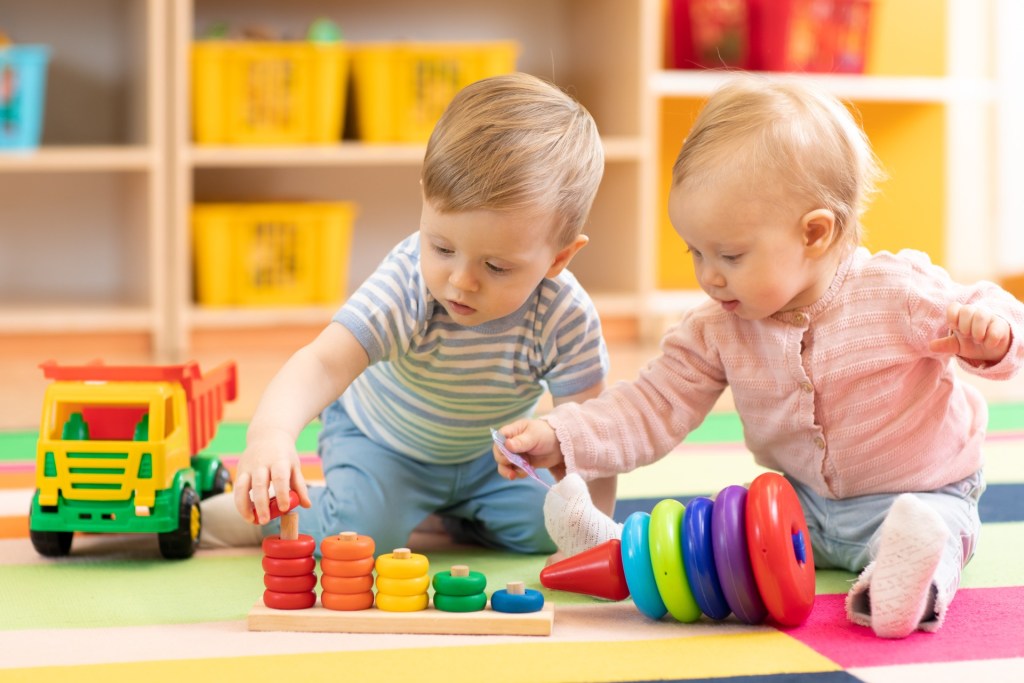When it comes to picking out the ideal childcare situation for your baby, parents are always looking for the best possible placement for their child. What works for one family, may not work for another, based on many environmental, and instructional factors. Some parents want their child cared for in a more intimate setting, with few other children or exposures, while other parents want their child to be around as many other little ones as possible to build social interactions. Neither is wrong, just simply opposite sides of the same coin.
There are no 100% right or wrong answers for what is the right childcare for baby watching, but there are a few things to look for when touring facilities or interviewing nannies that parents may want to keep in mind. Figuring out how to choose baby childcare isn’t the same for everyone. By keeping these reminders and tricks in their back pockets, parents can quickly pass or fail each person or facility with ease, knowing they’ve made the best possible choice for their precious little one’s care and early education.

There’s no place like home, right?
While some parents can make income and employment arrangements to avoid needing childcare – for several reasons but let’s get real here, that stuff is EXPENSIVE! Any kind of care related to children comes at a cost these days, and a good childcare facility – and even home-based care – is on the pricey side. Because of this, parents can sometimes make sacrifices financially to save themselves the bill and the logistical nightmare of having to chauffer their infant to and from.
While this is not always feasible, and some parents just cannot give up their careers or income stream, parents also have the possibility of choosing to keep their child at home with home-based care. This can come in various forms, but the most common ones are family members or nannies. These people travel to your home and stay there with your baby while parents head to work. By having your childcare arrangement set up at home, your baby gets to always stay in their own home and environment. Home-based care costs can fluctuate but tend to be more on the more cost-effective side and less expensive to parents – though this isn’t always the case. Parents who rely on family members for childcare usually stand to save the most money, making it a lucrative deal for those who can make the most of this type of situation.
Off to daycare we go!
If being a full-time, stay-at-home parent just isn’t in the cards for you or your partner, we understand. It’s a tough job, and not everyone is built to withstand the pressures of that lifestyle. Home-based care isn’t always feasible either, making a childcare facility the best choice for busy working moms and dads. Plenty of parents must make the transition to childcare, and we have a list of a few things to keep in mind when selecting the perfect place for your precious little one.
- Show up unannounced. Yes, you heard that right. If you, as a parent, want to get a real sense of what daily life looks like in a childcare facility you are looking to tour or visit, the best way to do so is to show up unannounced. By catching the administration and staff off guard, parents are likely to be met with a more honest and clearer picture of the kind of care their child will receive while there. Most facilities are more than up to standards, not having a designated date and time keeps things fresh and authentic.
- Check the credentials. You’ve found a childcare location, and you’re ready to start talking about enrollment. You showed up, got a tour, and heard about all the wonderful accreditation the facility has, however, did you take some time to check up on that information? So often, businesses use awards and certificates in their marketing plans, but fail to mention that those accreditations were limited to certain aspects of the business or had it once and then did not keep the same standards for meeting it again.
- Take recommendations from pediatricians or trusted friends or parent groups. Word of mouth is still one of the biggest tools for businesses to harness, so having a good reputation among parents will help a certain facility stand out to prospective clients.
At the end of it all, once a parent begins touring daycare facilities, they will often feel when they’ve entered the right one. That may seem silly or whimsical to some, but the truth is that parents will have an idea right off the bat if one place or another would be best for their babies. Observations such as happy, playful children with lots of smiles and sharing, in addition to employees and caregivers who are also equally happy and cohesively working together will paint a truly clear picture of what goes on inside its walls. Having a clear idea of the kind of care you want for your child, understanding your budget, and nailing down your commute down thoroughly will also help parents in the transition as well.



